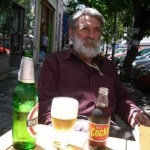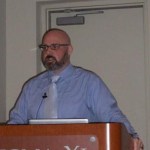
The task of government in this enlightened time does not extend to actually dealing with problems. Solving problems might put bureaucrats out of work. No, the task of government is to make it look as though problems have been solved, while continuing to keep the maximum number of consultants and bureaucrats employed dealing with them.
- Bob Emmers
If a publisher offered me a contract to write a book under a title that would be something like "Unscientific America", how would I go about it?
I would definitely be SUCH a scientist! But, being such a scientist does not mean indulging in Sesquipedalian Obscurantism. Being such a scientist means being dilligent, thorough and systematic in one's reasearch. And then being excited about presenting the findings, while being honest about the degree of confidence one can have in each piece of information.
I was not offered a book contract, and I do not have the resources and nine or twelve months…
As always, you should rate the articles, post notes and comments and send trackbacks when you blog about the papers. You can now also easily place articles on various social services (CiteULike, Mendeley, Connotea, Stumbleupon, Facebook and Digg) with just one click. Here are my own picks for the week - you go and look for your own favourites:
Crawling to Collapse: Ecologically Unsound Ornamental Invertebrate Fisheries:
Fishery management has historically been an inexact and reactionary discipline, often taking action only after a critical stock suffers overfishing or collapse. The…
As you know you can see everyone who's registered for the conference, but I highlight 4-6 participants every day as this may be an easier way for you to digest the list. You can also look at the Program so see who is doing what.
Cameron Neylon is a Senior Scientist at the ISIS Pulsed Neutron Source, Rutherford Appleton Laboratory, near Oxford with a joint appointment as a Lecturer in Chemical Biology at the School of Chemistry at the University of Southampton. He blogs on Science in the open and tweets. At the conference Cameron will do a demo of Google Wave for scientists who are complete…
For a long time it puzzled me how something so expensive, so leading edge, could be so useless, and then it occurred to me that a computer is a stupid machine with the ability to do incredibly smart things, while computer programmers are smart people with the ability to do incredibly stupid things. They are, in short, a perfect match.
- Bill Bryson
As you know you can see everyone who's registered for the conference, but I highlight 4-6 participants every day as this may be an easier way for you to digest the list. You can also look at the Program so see who is doing what.
Tom Levenson is the Director of the Graduate Program in the Writing and Humanistic Studies program at MIT. He blogs on the Inverse Square blog and tweets. I interviewed Tom last year. At the conference, Tom will co-moderate the session From Blog to Book: Using Blogs and Social Networks to Develop Your Professional Writing.
Val Jones, MD is the President and CEO of…
There are 25 new articles in PLoS ONE today. As always, you should rate the articles, post notes and comments and send trackbacks when you blog about the papers. You can now also easily place articles on various social services (CiteULike, Mendeley, Connotea, Stumbleupon, Facebook and Digg) with just one click. Here are my own picks for the week - you go and look for your own favourites:
VitisNet: 'Omics' Integration through Grapevine Molecular Networks:
Genomic data release for the grapevine has increased exponentially in the last five years. The Vitis vinifera genome has been sequenced…
Look at everything as though you were seeing it either for the first or last time. Then your time on earth will be filled with glory.
- Betty Smith
Continuing with the introductions to the sessions on the Program, here is what will happen on Sunday, January 17 at 9:00-10:05am:
A. Earth Science, Web 2.0+, and Geospatial Applications - Jacqueline Floyd and Chris Rowan
Description: We will discuss online and mobile applications for earth science research, including solid earth, ocean, and atmosphere subtopics. Current topics planned for discussion are Google Earth for geospatial applications, iPhone and other mobile applications, collaboration tools such as Google Wave, and cloud computing platforms such as Amazon's EC2 for…
One must pass through the circumference of time before arriving at the center of opportunity.
- Baltasar Gracian
As you know you can see everyone who's registered for the conference, but I highlight 4-6 participants every day as this may be an easier way for you to digest the list. You can also look at the Program so see who is doing what.
Walter Jessen is a cancer biologist and bioinformatician. He is the editor at Highlight HEALTH and Next Generation Science. And he tweets. At the conference, Walter will lead the session on Medicine 2.0 and Science 2.0--where do they intersect? and the session on Medical journalism.
Sabine Vollmer, former science reporter for Raleigh News and Observer, now writes and…
Two years ago, at the 2008 Science Blogging Conference, Dave Munger introduced to the world a new concept and a new wesbite to support that concept - ResearchBlogging.org. What is that all about?
Well, as the media is cuttting science out of the newsroom and the science reporting is falling onto institutional press information officers and science bloggers, more and more people are looking for scientific information on science blogs, especially as the expertise of the blogger is likely to provide a more accurate assessment of a freshly published study than the mainstream media can usually do…
The December 2009 edition of the Journal of Science Communication is now online with some intriguing articles - all Open Access so you can download all the PDFs and read:
Control societies and the crisis of science journalism:
In a brief text written in 1990, Gilles Deleuze took his friend Michel Foucault's work as a starting point and spoke of new forces at work in society. The great systems masterfully described by Foucault as being related to "discipline" (family, factory, psychiatric hospital, prison, school), were all going through a crisis. On the other hand, the reforms advocated by…
As many of you, my readers, are interested in Open Access publishing and have given it quite some thought over time, I think you are the right kind of people to contribute to this in a thoughtful and persuasive manner. Please do it.
From everyONE blog:
The White House Office of Science and Technology Policy has invited comment on broadening public access to publicly funded research and they want to hear from you. Please post your contributions to this blog.
Their Request for Information (RFI) lasts for just 30 days and expires on 7 January 2010, so we'd like to encourage you to get involved…
How Ebola Impacts Genetics of Western Lowland Gorilla Populations:
Emerging infectious diseases in wildlife are major threats for both human health and biodiversity conservation. Infectious diseases can have serious consequences for the genetic diversity of populations, which could enhance the species' extinction probability. The Ebola epizootic in western and central Africa induced more than 90% mortality in Western lowland gorilla population. Although mortality rates are very high, the impacts of Ebola on genetic diversity of Western lowland gorilla have never been assessed. We carried out…
You can live a lifetime and, at the end of it, know more about other people than you know about yourself.
- Beryl Markham
Although I've known Craig McClain for a few years now, both online and offline, I only had some vague ideas about what kind of research he is doing. I knew it has something to do with the Deep Sea and with the evolution of body size, but I did not know the details. So, when the opportunity arose to hear him give a talk summarizing his work, I jumped to it and went to see him on Tuesday at Sigma Xi as a part of their pizza lunch series.
First I have to say that Craig is a great speaker (if you are looking for one for a seminar series, this is useful information for you) - it was fun and very…
As you know you can see everyone who's registered for the conference, but I highlight 4-6 participants every day as this may be an easier way for you to digest the list. You can also look at the Program so see who is doing what.
Cynthia Allen is the Editor and Writer in the Office of Science Education at National Institutes of Health where she blogs on their SciEd blog. She is also on Twitter.
Laurel Bacque is in charge of communications, a blogger, and the online community manager for the IceCube - the South Pole neutrino-hunting telescope. And she is on Twitter.
Craig McClain is the…

